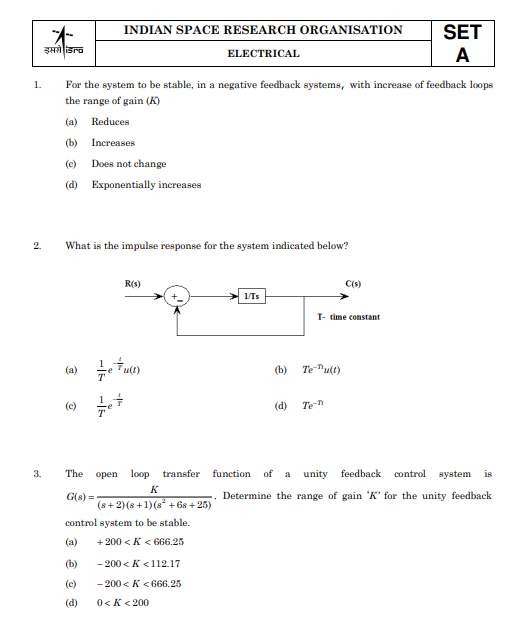|
#4
24th February 2015, 11:28 AM
| |||
| |||
| Re: ISRO Electrical and Electronics previous year question papers
Here I am providing you Syllabus and Previous Years Question Papers of ISRO Electrical and Electronics Exam. ISRO Electrical Exam Syllabus: Basic Electrical Technology Circuit Theory Electromagnetic Fields Electrical Machines I Power Systems Analysis Control Engineering Electrical Machines II Power Systems Operation and Control Power Electronics Power System Protection High Voltage Engineering Industrial Drives Industrial Drives - Power Electronics Embedded Systems Intelligent Systems and Control Industrial Automation and Control Illumination Engineering Industrial Instrumentation Chaos, Fractals & Dynamic Systems Energy Resources & Technology Non-Conventional Energy Systems Numerical Analysis Power System Generation, Transmission and Distribution Networks Signals and Systems Networks and Systems Digital Integrated Circuits Analog ICs Dynamics of Physical Systems Estimation of Signals and Systems Digital Signal Processing ISRO Electronics Exam Syllabus: (1) Physical Electronics, Electron Devices and ICs: Electrons and holes in semi-conductors, Carner Statistics, Mechanism of current flow in a semiconductor, Hall effect; Junction theory; Different types of diodes and their characteristics; Bipolar Junction transistor; Field effect transistors; Power switching devices like SCRs, GTOs, power MOSFETs; Basics of ICs-bipolar, MOS and CMOS types; basic and Opto Electronics. (2) Signals and Systems: Classification of signals and systems; System modeling in terms of differential and difference equations; State variable representation; Fourier series; Fourier transforms and their application to system analysis; Laplace transforms and their application to system analysis; Convolution and superposition integrals and their applications; Z-transforms and their applications to the analysis and characterization of discrete time systems; Random signals and probability; Correlation functions; Spectral density; Response of linear system to random inputs. (3) Network Theory: Network analysis techniques; Network theorems, transient response, steady state sinusoidal response; Network graphs and their applications in network analysis; Tellegen's theorem. Two port networks; Z, Y, h and transmission parameters. Combination of two ports, analysis of common two ports. Network functions: parts of network functions, obtaining a network function from a given part. Transmission criteria: delay and rise time, Elmore's and other definitions effect of cascading. Elements of network synthesis. (4) Electromagnetic Theory: Analysis of electrostatic and magneto-static fields; Laplace's and Poisson's equations; Boundary value problems and their solutions; Maxwell's equations; application to wave propagation in bounded and unbounded media; Transmission lines: basic theory, standing waves, matching applications, microstrip lines; Basics of wave guides and resonators; Elements of antenna theory. (5) Analog Electronic Circuits: Transistor biasing and stabilization. Small signal analysis. Power amplifiers. Frequency. response. Wide banding techniques. Feedback amplifiers. Tuned amplifiers. Oscillators, Rectifiers and power supplies. Op Amp, PLL, other linear integrated circuits and applications. Pulse shaping circuits and waveform generators. (6) Digital Electronic Circuits: Transistor as a switching element; Boolean algebra, simplification of Boolean function Karnaugh map and applications; IC Logic gates and their characteristics; IC logic families: DTL, TTL, ECL, NMOS, PMOS and CMOS gates and their comparison; Combinational logic circuits; Half adder, Full adder; Digital comparator; Multiplexer De-multiplexer; ROM and their applications. Flip-flops. R-S, J-K, D and T flip-tops; Different types of counters and registers. Waveform generators. A/D and D/A converters. Semi-conductor memories. (7) Control Systems: Transient and steady state response of control systems; Effect of feedback on stability and sensitivity; Root locus techniques; Frequency response analysis. Concepts of gain and phase margins; Constant-M and Constant-N Nichol's Chart; Approximation of transient response from Constant-N Nichol's Chart; Approximation of transient response from closed loop frequency response; Design of Control Systems; Compensators; Industrial controllers. (8) Communication Systems: Basic information theory; Modulation and detection in analogue and digital systems; Sampling and data reconstructions; Quantization and coding; Time division and frequency division multiplexing; Equalization; Optical Communication: in free space and fiber optic; Propagation of signals at HF, VHF, UHF and microwave frequency; Satellite Communication. (9) Microwave Engineering: Microwave Tubes and solid state devices, Microwave generation and amplifiers, Wave guides and other Microwave Components and Circuits, Microstrip circuits, Microwave Antennas, Microwave Measurements, Masers, Lasers; Micro-wave propagation. Microwave Communication Systemsterrestrial and satellite based. (10) Computer Engineering: Number Systems. Data representation; Programming; Elements of a high level programming language PASCAL/C; Use of basic data structures; Fundamentals of computer architecture; Processor design; Control unit design; Memory organization, I/o System Organization. Microprocessors: Architecture and instruction set of Microprocessor's 8085 and 8086, Assembly language Programming. Microprocessor Based system design: typical examples. Personal computers and their typical uses. Previous Years Question Papers of ISRO Electrical and Electronics Exam:  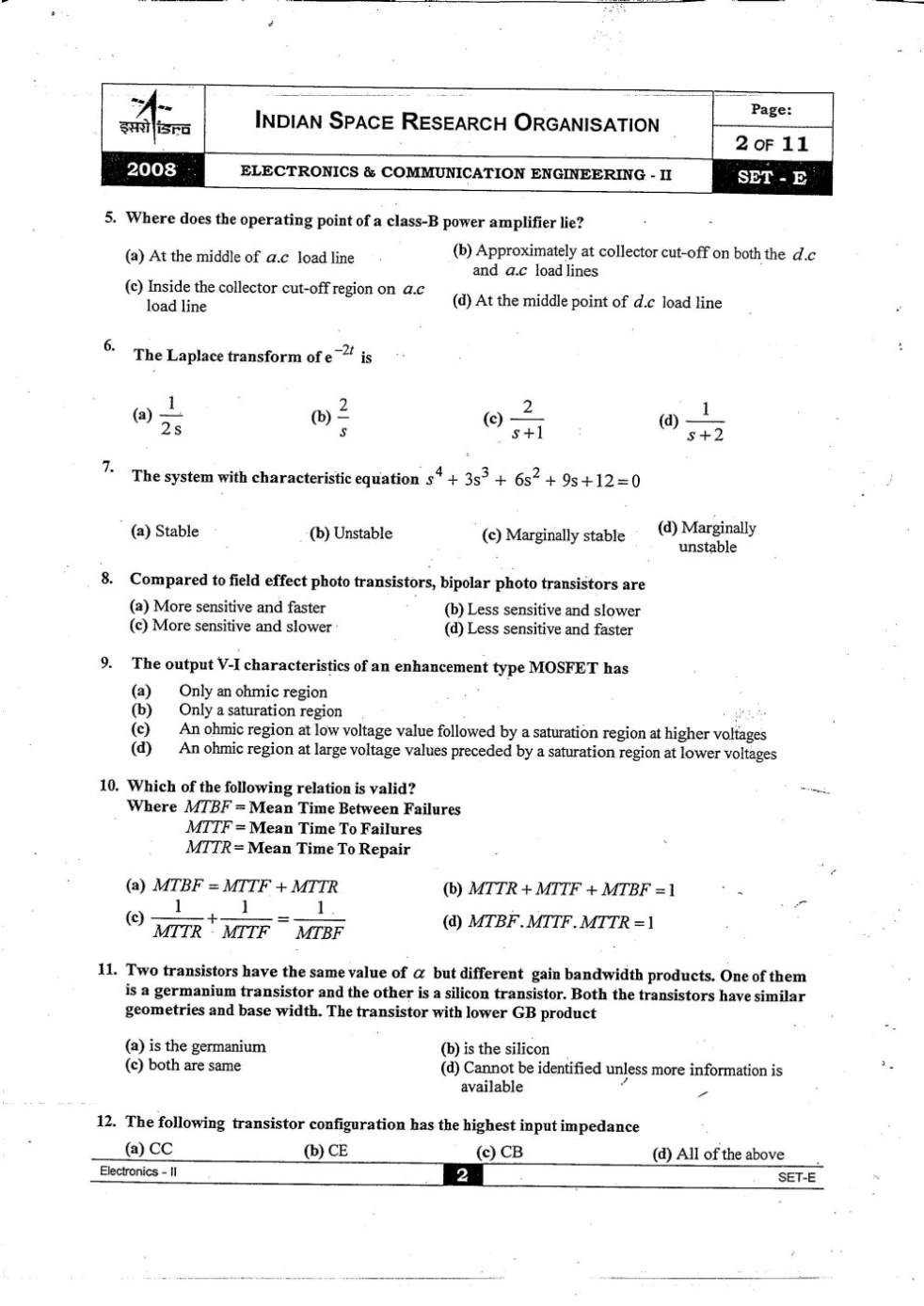 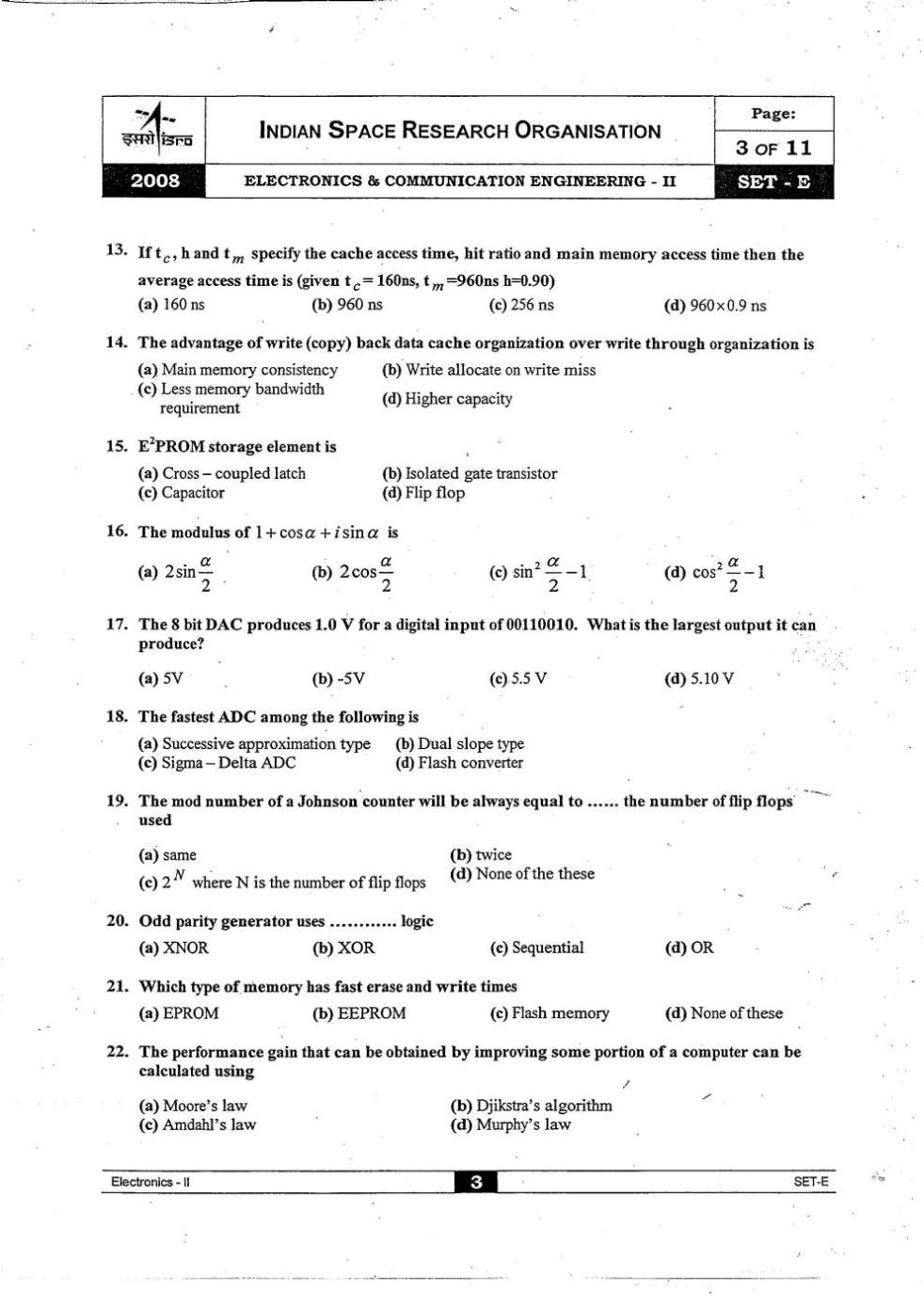 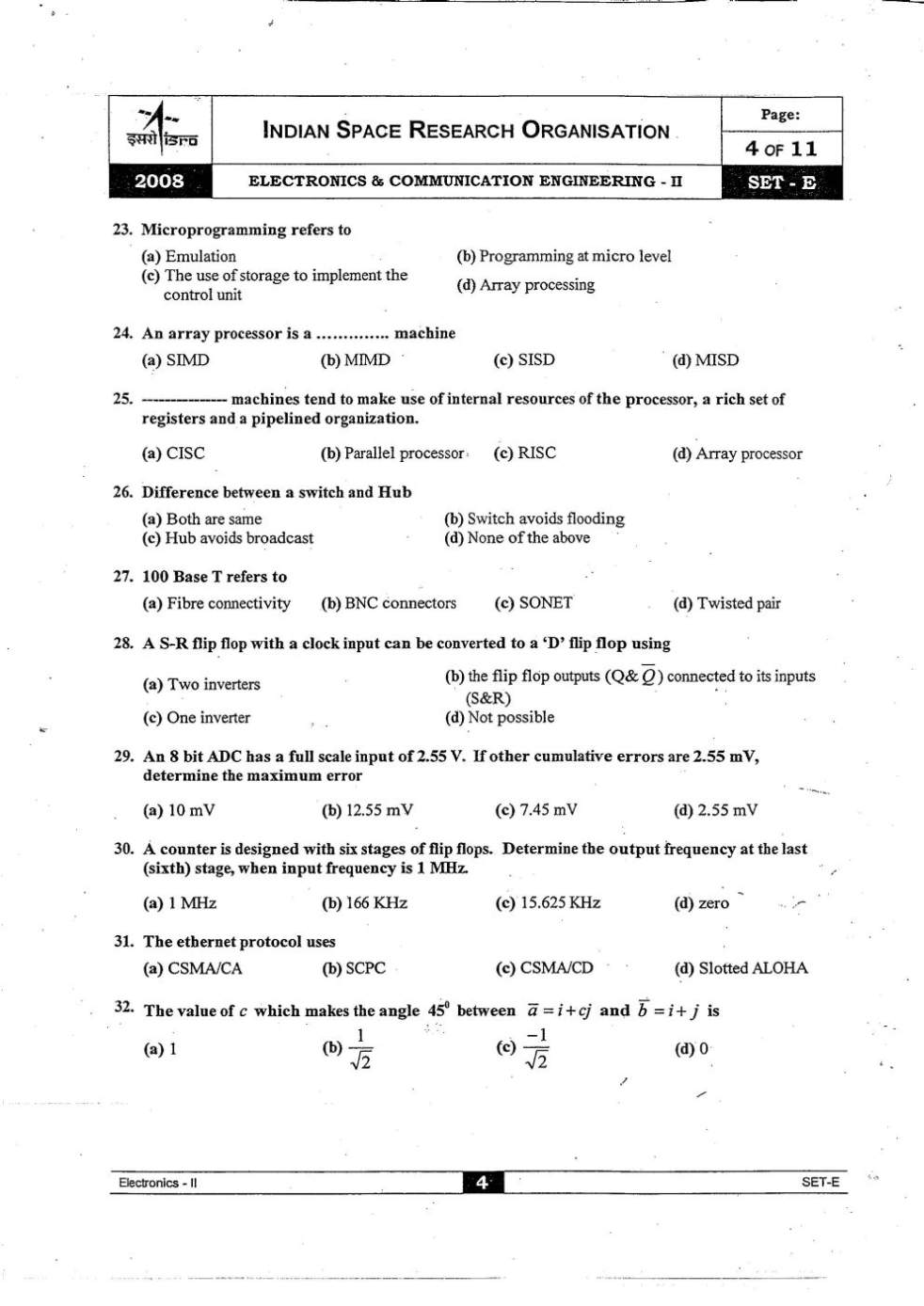 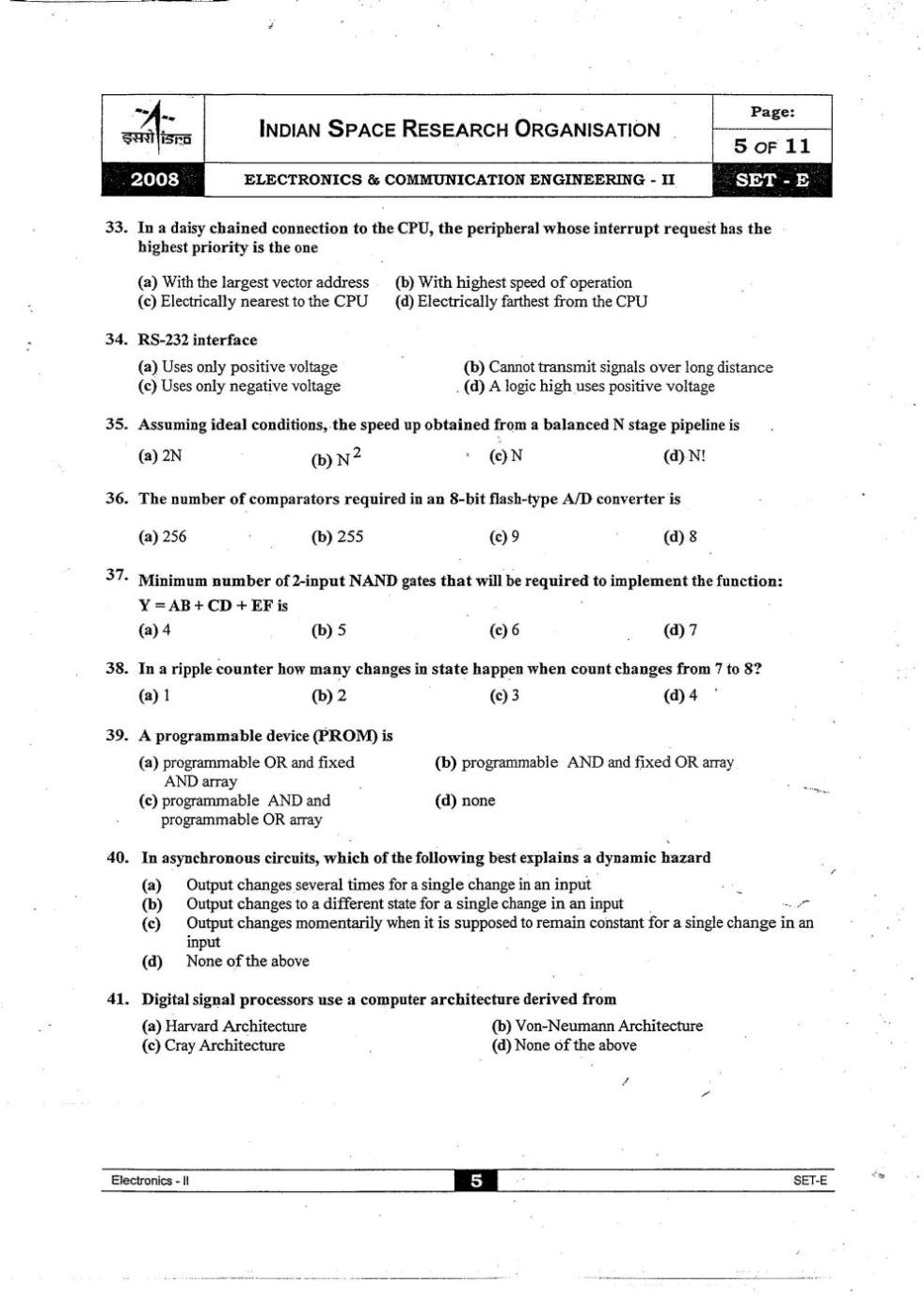 |
